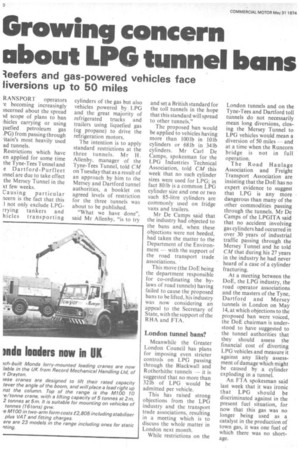Growing concern about LPG tunnel bans
Page 12

If you've noticed an error in this article please click here to report it so we can fix it.
leefers and gas-powered vehicles face liversions up to 50 miles
RANSPORT operators -e becoming increasingly )ncerned about the spread id scope of plans to ban !hides carrying or using luefied petroleum gas .PG) from passing through -itain's most heavily used ad tunnels.
Restrictions which have en applied for some time the Tyne-Tees Tunnel and e Dartford-Purfleet mnel are due to take effect the Mersey Tunnel in the xt few weeks.
Causing particular acern is the fact that this I not only exclude LPGrrying tankers and hides transporting cylinders of the gas but also vehicles powered by LPG and the great majority of refrigerated trucks and trailers using liquefied gas (eg propane) to drive the refrigeration motors.
The intention is to apply standard restrictions at the three tunnels. Mr H. Allenby, manager of the Tyne-Tees Tunnel, told CM on Tuesday that as a result of an approach by him to the Mersey and Dartford tunnel authorities, a booklet on agreed levels of restriction for the three tunnels was about to be published.
"What we have done", said Mr Allenby. "is to try and set a British standard for the toll tunnels in the hope that this standard will spread to other tunnels."
The proposed ban would be applied to vehicles having more than 100 lb in 101h cylinders or 6811) in 34 lb cylinders. Mr Carl De Camps, spokesman for the LPG Industries Technical Association, told CM this week that no such cylinder sizes were used for LPG; in fact 801b is a common LPG cylinder size and one or two such 85-litre cylinders are commonly used on fridge vans and trailers.
Mr De Camps said that the industry had objected to the bans and, when these objections were not heeded, had taken the matter to the Department of the Environment — with the support of the road transport trade associations.
This move (the DoE being the department responsible for co-ordinating the bylaws of road tunnels) having failed to cause the proposed bans to he lifted, his industry was now considering an appeal to the Secretary of State, with the support of the RHA and FTA.
London tunnel bans?
Meanwhile the Greater London Council has plans for imposing even stricter controls on LPG passing through the Blackwall and Rotherhithe tunnels — it is suggested that no more than 321b of LPG would be admitted per vehicle.
This has raised strong objections from the LPG industry and the transport trade associations, resulting in a meeting which is to discuss the whole matter in London next month.
While restrictions on the London tunnels and on the Tyne-Tees and Dartford toll tunnels do not necessarily mean long diversions, closing the Mersey Tunnel to LPG vehicles would mean a diversion of 50 miles — and at a time when the Runcorn bridge is not in full operation.
The Road Haulage Association and Freight Transport Association are insisting that the DoE has no expert evidence to suggest that LPG is any more dangerous than many of the other commodities passing through the tunnels. Mr De Camps of the LPGITA said that no accident involving gas cylinders had occurred in over 30 years of industrial traffic passing through the Mersey Tunnel and he told CM that during his 27 years in the industry he had never heard of a case of a cylinder fracturing.
At a meeting between the DoE, the LPG industry, the road operator associations and the masters of the Tyne, Dartford and Mersey tunnels in London on May 14, at which objections to the proposed ban were voiced, the DoE chairman is understood to have suggested to the tunnel authorities that they should assess the financial cost of diverting LPG vehicles and measure it against any likely assessment of damage which might be caused by a cylinder exploding in a tunnel.
An FTA spokesman said last week that it was ironic that LPG should be discriminated against in the present fuel situation, for now that this gas was no longer being used as a catalyst in the production of town gas, it was one fuel of which there was no shortage.




























































































